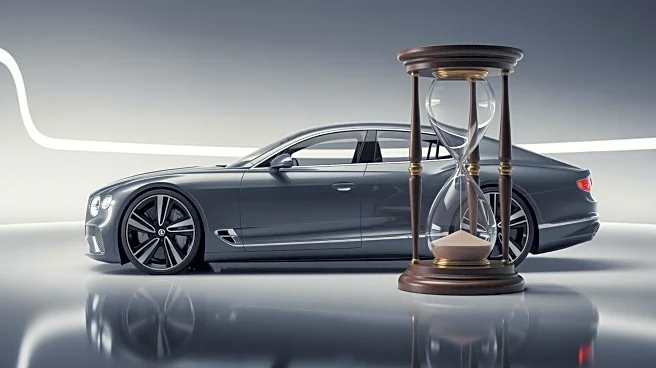What's Happening?
Bentley Motors has announced a revision to its electric vehicle strategy, extending the sale of internal combustion-engine and plug-in hybrid cars until at least 2035. This decision marks a shift from Bentley's initial plan to transition to electric-only
vehicles by 2035, as part of its Beyond100+ strategy. The company will continue to offer models like the Continental GT and Flying Spur, driven by customer demand for hybrid options. Bentley also unveiled its first electric vehicle, branded as the world's first true luxury urban SUV, featuring advanced technology capable of charging from 0 to 100 miles in under seven minutes. The development of this vehicle is ongoing, with prototype models undergoing global performance testing.
Why It's Important?
Bentley's decision to extend the sale of hybrid vehicles reflects the evolving dynamics of the automotive market and consumer preferences. By maintaining a diverse product lineup, Bentley aims to cater to customers who are not yet ready to fully transition to electric vehicles. This strategy could help Bentley maintain its market position and customer base while gradually adapting to the industry's shift towards electrification. The move also highlights the challenges luxury automakers face in balancing innovation with traditional offerings, as they navigate the transition to sustainable mobility solutions.
What's Next?
Bentley's Beyond100+ strategy includes significant investments in its manufacturing infrastructure, with plans to open a new state-of-the-art Paint Shop in 2026. This follows the recent opening of a new Design Centre and Integrated Logistics Centre. These developments are part of Bentley's efforts to secure its future and adapt to changing market demands. As Bentley continues to evolve its product offerings, the company will likely monitor customer feedback and market trends to inform future decisions regarding its vehicle lineup and sustainability initiatives.
Beyond the Headlines
Bentley's strategy to extend hybrid sales may have broader implications for the luxury automotive industry, as other manufacturers may also reconsider their electrification timelines. The decision underscores the importance of flexibility in corporate strategies, allowing companies to adapt to unforeseen market shifts and consumer behaviors. Additionally, Bentley's investment in carbon-neutral facilities and sustainable practices reflects a growing trend among automakers to prioritize environmental responsibility alongside technological advancement.
















